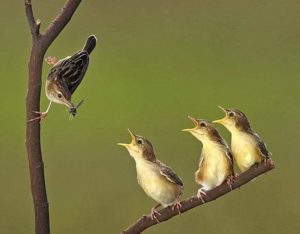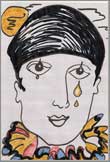Such a provocative line from Helen Burke’s poem about her auntie’s dog, the ‘black as black can be’ Flossie. Flossie, you see, will whisper the names of the fallen creatures that the boys shoot during their hunt.
Poignancy comes to life in contrast with cruelty.
A birds falls from a nest. Another flutters into a sun-glared window. But birds blasted from flight by boys for fun is wanton sport and the dog as witness testifies to the injustice.
This line in Helen’s poem set off a cascade of feelings.
Am sitting in Sunday mass, hearing about sparrows falling to the ground, learning that even this insignificant death is known. I don’t care ‘who knows’ only that it is known, that nothing is lost, hidden, forgotten.
I’m not drawn to biblical references or imagery but this one about the sparrows falling has stuck. It is from Matthew 10 (yes, I looked it up).
“Are not two sparrows sold for a penny? And not one of them will fall to the ground apart from your Father knowing.” So the dog is doing god-service by naming the birds, recording their existence.
And then I recall this snippet from attending many, many Sunday masses, “and even the stones shall speak.” I literally see stones voicing, witnessing, participating in events. Who hears them? Those who can.
Looking this one up as well, I see a version by Luke:
But some of the Pharisees in the crowd said to Him, “Teacher, rebuke Your disciples!” “I tell you, He answered, “if they remain silent, the very stones will cry out.”
Again, the stones. Can’t you feel how the Pharisees might feel the slightest anxiety at Jesus’s response? Or maybe not. He may be the ‘fool on the hill’ already.
And as I uncovered this NT quote, a reference to older stones suddenly waved at me on the biblical page sidebar, ‘Read this! Don’t pass me over!’ Old Testament old. Habakkuk 2:11 old:
10 You have devised a shameful thing for your house By cutting off many peoples; So you are sinning against yourself. 11 Surely the stone will cry out from the wall, And the rafter will answer it from the framework. 12 Woe to him who builds a city with bloodshed And founds a town with violence!…
(This quote came from biblehub.com, what else!)
By the way, who was Habakkuk, oh Wikipedia? “The book of Habbakuk consists of five oracles about the Chaldeans (Babylonians) and a song of praise to God.” That’s all they/we know. We’re talking about 6th century BC. He was a prophet.
Again, injustice can incite the very stones to cry out, shout, reveal evil deeds. And, please note, dear reader, this refreshingly enigmatic addition: So you are sinning against yourself. Habb doesn’t condemn only; he points out that these shameful things hurt the doer. By the way, it seems that the ‘doer’ who builds a city with bloodshed/violence is also self-inflicting harm.
Conclusions can be multi-faceted. My simple mind summarizes: ‘Nothing is hidden from the grand scheme of things.’ Or the small scheme of things. ‘Everything is everything,’ a grad school friend would say.
I’ve heard about a seeker who was told to pray to the diving presence in complete isolation. The seeker hiked and hiked to the vast wilderness, found a cave, sat to pray. No good. The seeker returned, concluding, “There is no place where the Presence is not with me.” Nothing is hidden, everything is everything.
Remember, centuries ago most thought the earth was center of the solar system. No, poor Copernicus knew the sun was central but was reluctant to publish his views fearing persecution. He finally published prior to leaving his place on earth, On the Revolutions of the Celestial Spheres (in Latin), and set off the ‘Copernican Revolution’!
Wikipedia: This revolution was ‘the paradigm shift from the Ptolemaic model of the heavens, which described the cosmos as having Earth stationary at the center of the universe, to the heliocentric model with the Sun at the center of the Solar System.’ (Paradigm: Greek for ‘example’.)
Geocentrism, a scourge then and now! (Read about today’s flat-earther proponents.) It also feels like that prevalent affliction – egocentrism…
We still think we’re the center of the universe and, in a small sense, we may be. We’re like those windowless monads that Leibnez conjectured. Well, if this is the case then we’d better scrape a peephole in our monad shell; enlarge our orbits to include everyone – even the sparrows.
The drawing, ‘Tears Down My Face’ is by Helen Burke.

My poem from ago:
Permit Wonder
Electrons wander orbits tipping the cosmos.
Planets in weary tread stoic a pace unshared
Embryos slide into time chasing desire & find.
The mind awakens from its cloister to canopies
of sensations that blaze and speak within.
We lay in twilight harbors moored to mysteries,
Netted between the sureness of a soft breeze
And moments capsized.
Wandering these many roads is the heart,
Orphaned or welcomed, in song or moan,
Backpacked, stowed or falling loose
Around another’s clear gaze.
Could someone run ahead — secure lodging
Corner a spaciousness
Of no particular place?
And trim the smooth to manage the harsh.
Concede the fine points forever displayed.
Unargue differences that winter a summer’s day
And doubt every open door closed.
Breathe in, exhale
And permit wonder
To rest on the tongue.
*
Jan Keough – Copy write, rev. 2017
